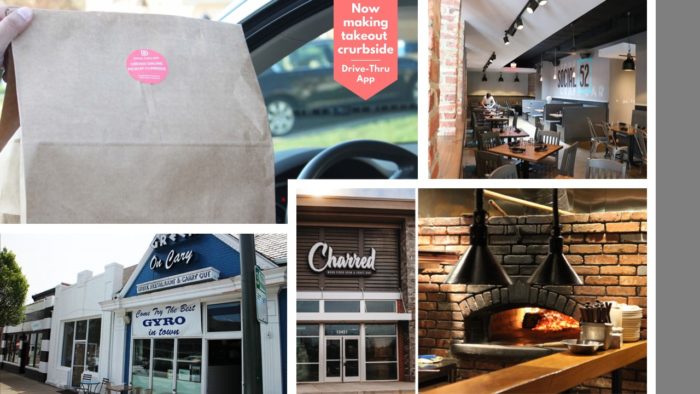Just as to-go has become the go-to for getting restaurant food, a Richmond startup has launched an app intended to make takeout easier.
Khadeeja Suleman in recent months went live with Drive-Thru, a mobile app designed specifically for takeout food orders. The app compiles restaurants and their menus, and provides in-app communications between the customer and restaurant to facilitate food purchasing and pickup.
Suleman, the company’s CEO and co-founder, said she developed the app and launched quietly in October out of Startup Virginia in Shockoe Bottom based on her frustration with the takeout experience. But the onset of the coronavirus pandemic and its effect on restaurants added a sense of urgency to the endeavor.
“We were testing our app in the market right around that time (the pandemic hit) and we decided to speed up the release and partnerships with restaurants during these times,” she said. “Given this new world we now live in and it’s here to stay for some time, we see that the way people will like to order their food will drastically change.”
Drive-Thru has signed on five Richmond-area restaurants: Greek on Cary, Weezie’s Kitchen, Monster Taco, Social 52 and Charred, as well as The D Loft Cafe in Michigan, on Monday.
Suleman said the app has had steady usage in recent weeks, and there are more than 1,200 regular users of it.
She enters a crowded, competitive field, taking on some of the giants of the online food ordering world, and restaurant chains that have their own takeout system. Suleman is betting that the app’s lack of fees for partner restaurants will pave the way for adoption despite the presence of competitor services. Drive-Thru doesn’t levy any set-up or commission costs paid by restaurants. The app makes money off flat $1 fees levied on users for each order, Suleman said. The app also charges a convenience fee for credit cards.
Similar services, such as Uber Eats, charge startup fees and take a percentage of order sales, which can range from 15 to 30 percent of sales, Suleman said.
Her goal is to see the app replace the use of phone calls to place takeout orders. In addition to menus, the app features in-program communications that allow customers to submit orders and alert restaurants when they arrive to pick up those orders. Payment also is handled over the app.
Suleman said the platform cost $100,000 to create. She and her business partner David Wright, the venture’s only employees, put up the money. The company is Suleman’s full-time gig and it is based out of Startup Virginia, which is located in the Capital One 1717 Innovation Center.
Suleman previously founded and operated Mina Kay, a fashion accessory company that catered to parents who wanted fashionable diaper bags and related items. She ended production and marketing for that company to focus on Drive-Thru.
Looking beyond restaurants, Suleman would like to make the jump into curbside retail purchases and pickups. When those expansions may take place is undecided, given the ongoing pandemic.
Just as to-go has become the go-to for getting restaurant food, a Richmond startup has launched an app intended to make takeout easier.
Khadeeja Suleman in recent months went live with Drive-Thru, a mobile app designed specifically for takeout food orders. The app compiles restaurants and their menus, and provides in-app communications between the customer and restaurant to facilitate food purchasing and pickup.
Suleman, the company’s CEO and co-founder, said she developed the app and launched quietly in October out of Startup Virginia in Shockoe Bottom based on her frustration with the takeout experience. But the onset of the coronavirus pandemic and its effect on restaurants added a sense of urgency to the endeavor.
“We were testing our app in the market right around that time (the pandemic hit) and we decided to speed up the release and partnerships with restaurants during these times,” she said. “Given this new world we now live in and it’s here to stay for some time, we see that the way people will like to order their food will drastically change.”
Drive-Thru has signed on five Richmond-area restaurants: Greek on Cary, Weezie’s Kitchen, Monster Taco, Social 52 and Charred, as well as The D Loft Cafe in Michigan, on Monday.
Suleman said the app has had steady usage in recent weeks, and there are more than 1,200 regular users of it.
She enters a crowded, competitive field, taking on some of the giants of the online food ordering world, and restaurant chains that have their own takeout system. Suleman is betting that the app’s lack of fees for partner restaurants will pave the way for adoption despite the presence of competitor services. Drive-Thru doesn’t levy any set-up or commission costs paid by restaurants. The app makes money off flat $1 fees levied on users for each order, Suleman said. The app also charges a convenience fee for credit cards.
Similar services, such as Uber Eats, charge startup fees and take a percentage of order sales, which can range from 15 to 30 percent of sales, Suleman said.
Her goal is to see the app replace the use of phone calls to place takeout orders. In addition to menus, the app features in-program communications that allow customers to submit orders and alert restaurants when they arrive to pick up those orders. Payment also is handled over the app.
Suleman said the platform cost $100,000 to create. She and her business partner David Wright, the venture’s only employees, put up the money. The company is Suleman’s full-time gig and it is based out of Startup Virginia, which is located in the Capital One 1717 Innovation Center.
Suleman previously founded and operated Mina Kay, a fashion accessory company that catered to parents who wanted fashionable diaper bags and related items. She ended production and marketing for that company to focus on Drive-Thru.
Looking beyond restaurants, Suleman would like to make the jump into curbside retail purchases and pickups. When those expansions may take place is undecided, given the ongoing pandemic.





It’s worth pointing out, a lot of people using third party apps end up paying a lot more, and the local restaurants end up getting less, with some of the larger third party apps.
apparently this one does not have that problem.